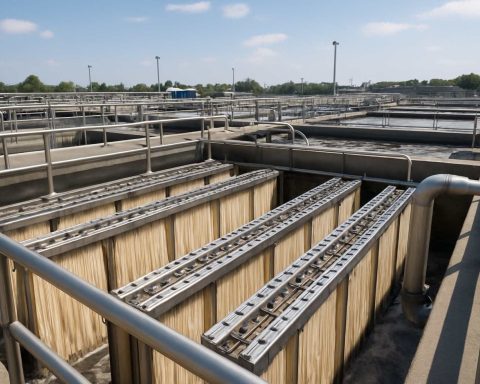- Taiwan is poised to become a hub for the fusion of artificial intelligence and renewable energy through geothermal resources.
- Google partners with Baseload Capital to build Taiwan’s largest geothermal facility, generating 10 megawatts of sustainable power.
- This project aims to energize Google’s local data centers by 2029, supporting AI chip production in collaboration with MediaTek.
- Taiwan targets 6 gigawatts of geothermal capacity by 2050, enhancing its leadership in renewable energy.
- Google’s initiative highlights its commitment to global sustainability and may influence other tech companies to reconsider their environmental impact.
The lush, mountainous island of Taiwan is set to become the epicenter of a groundbreaking fusion between artificial intelligence and renewable energy. Tucked along the volatile yet bountiful Pacific Ring of Fire, Taiwan offers a unique geological marvel—an expansive reserve of geothermal energy waiting just beneath its surface. Google, in its relentless pursuit of innovation, has cast its eyes on this molten potential, propelling the region toward a sustainable future.
The tech giant, renowned for its artificial intelligence prowess and ambitious energy goals, partners with Baseload Capital, a vanguard in geothermal development, to erect Taiwan’s largest geothermal facility. This endeavor, which promises to churn out 10 megawatts of sustainable power, not only doubles the nation’s current geothermal capabilities but also underscores Google’s vision—a harmonious blend of cutting-edge technology and environmental stewardship.
This strategic alliance marks a significant leap forward in Taiwan’s aspirations to embrace green energy, complementing its solar and wind resources. By 2029, the geothermal plant aims to energize Google’s local data centers and offices, playing a pivotal role in the creation of AI chips and their backbone, the Tensor Processing Units. Here, in collaboration with AI chip manufacturer MediaTek, Google seeks to intertwine energy efficiency with technological supremacy.
Taiwan embraces this initiative, synchronized with its own ambitious target of 6 gigawatts of geothermal capacity by 2050. Keen to establish itself as a leader in renewable energy, the nation welcomes public-private partnerships like this one, carving a path toward an eco-friendlier tomorrow.
For Google, however, this venture signifies more than regional investment. It’s a testament to its broader ambition of global sustainability leadership. Google’s strategic strides in renewable energy distinguish it from competitors, pioneering a path few can rival. As Google’s geothermal dream takes root in the Asia-Pacific, it highlights a future where technology and sustainability are inextricably linked.
The implications of Google’s geothermal venture extend beyond energy output. It serves as a clarion call for other technological titans to reconsider their environmental footprints, potentially sparking a new green race fueled by innovation and responsibility. The world watches, waiting to see if this venture will catalyze a broader shift in the tech industry towards embracing Earth’s own resources to power the future.
Exploring Taiwan’s Geothermal Revolution: How Google and Baseload Capital are Leading the Charge
Unveiling Taiwan’s Geothermal Potential
Taiwan, with its strategic position along the Pacific Ring of Fire, is a treasure trove of untapped geothermal energy. This island nation plans to significantly bolster its renewable energy portfolio with a pioneering project driven by Google and Baseload Capital. As Taiwan moves towards an eco-friendly future, this collaboration aims to double the nation’s current geothermal capacity by generating 10 megawatts of sustainable power.
Real-World Use Cases and Technological Integration
Geothermal energy offers a consistent and reliable energy source ideal for large-scale operations. In conjunction with AI development, this power will be pivotal to energize Google’s data centers and local offices. This clean energy solution will support Google’s production of AI chips, particularly the Tensor Processing Units, in partnership with Taiwanese semiconductor giant MediaTek.
Taiwan’s Renewable Energy Ambitions
Taiwan is committed to elevating its renewable energy output, targeting 6 gigawatts of geothermal energy by 2050. This initiative not only underscores Taiwan’s commitment to combating climate change but also aligns with the global shift towards greener energy solutions. Public-private partnerships, like the one between Google and Baseload Capital, are critical to achieving these ambitious goals.
Insights and Predictions
This groundbreaking project is expected to serve as a blueprint for other tech giants. As the world focuses on sustainability, companies must rethink their energy consumption strategies and pivot towards more sustainable models. The success of this venture in Taiwan could potentially catalyze a broader shift in the tech industry towards leveraging the Earth’s renewables.
Pressing Questions: How Will This Change the Future?
1. What makes geothermal energy a viable option for Taiwan?
The stability and longevity of geothermal energy make it a reliable resource. Unlike solar and wind, geothermal energy provides a continuous power supply, crucial for energy-intensive operations such as data centers.
2. How might this project influence Taiwan’s economy?
The development of geothermal energy infrastructure is likely to stimulate local economies, create jobs, and position Taiwan as a leader in renewable energy innovation.
3. What are the environmental benefits of this initiative?
By reducing reliance on fossil fuels, this project decreases carbon emissions and promotes environmental stewardship, contributing to a healthier planet.
Controversies and Limitations
One potential limitation of geothermal energy is the high upfront cost of infrastructure development. Critics also argue about the environmental risks, including earthquakes and land subsidence, though these are typically minimal with modern technology and practices.
Recommendations and Quick Tips
– Diversify Energy Sources: Taiwan and other countries can benefit by incorporating a mix of renewable energies, such as solar and wind, in addition to geothermal.
– Stay Informed: For continuous updates on geothermal energy and renewable trends, follow industry leaders and publications for the latest insights.
Conclusion
Taiwan’s geothermal project, driven by Google and Baseload Capital, is more than a regional investment; it’s a significant move towards global sustainability. As other tech companies observe, this project might just set the stage for a future where innovation and environmental responsibility go hand in hand.
For more information about geothermal energy and Google’s sustainability efforts, visit Google.











